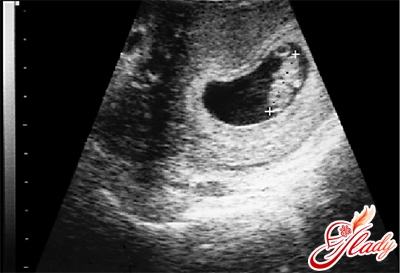
- Causes of the tone of the uterus
- Signs of hypertension
- Treatment of the tone of the uterus
Pregnancy is perhaps the most wonderful time inlife of every woman. Waiting for your baby should be calm and harmonious. This is important not only for the mother herself and a successful birth, but also for the future health of the child. But, unfortunately, as often happens, sometimes everything does not happen exactly as we would like. Recently, pathologies during pregnancy have become not an exception, but a rule. One of my doctor friends, who worked in a maternity hospital for more than 40 years, once noted that even 10 years ago, the pathology department was usually empty, but now there is simply no room there. And the most common diagnosis is high uterine tone. But this material is not created to scare expectant mothers, but only to warn and remind once again that taking care of your health during pregnancy should be a priority. And also to convey to women information about the threat of uterine tone. One of the consequences of an unhealthy lifestyle, constant stress or overwork can be uterine tone during pregnancy. Many women face this problem. But it should be remembered that tone during pregnancy does not mean a possible miscarriage. What is uterine tone during pregnancy, and how to determine and treat it in time, you will learn from our article below.So, first of all, I would like to reassure youexpectant mothers. Sometimes doctors intentionally or unknowingly make the situation worse, which has an even more detrimental effect on the situation and on the health of the woman and her baby. Having heard a frightening diagnosis and even more depressing comments from her doctor, a pregnant woman gets scared and begins to actively search the Internet for everything related to the query "pregnancy uterine tone". That is why we asked a gynecologist to tell us about this problem in this article and how to prevent uterine tone. Pregnancy and uterine tone do not always mean losing a child. Uterine tone is uncontrolled contractions in the uterus, which can lead to a miscarriage. However, other consequences of uterine tone are possible. Let's figure out what the uterus itself is and what normal uterine tone is. The uterus is an organ consisting of muscle tissue. The walls of the uterus themselves have three layers:
- the first layer outside covers the uterus, like a thin film
- In the middle between the outer and inner layers there is a muscular layer called "myometrium". It consists of connective and muscle fibers
- lining the uterus "endometrium"
Increased uterine tone during pregnancyis created by muscle fibers that have the ability to contract. During a normal pregnancy, the uterine muscles should be in a calm and relaxed state, called normotonicity. During nervous stress or overexertion, the muscle fibers contract, their tone and pressure in the uterus itself increase. This is called increased tone or hypertonicity of the uterus. Uterine tone can occur throughout pregnancy. Uterine tone in the second trimester usually appears due to overwork at work or an unhealthy lifestyle. In the third trimester, the size of the uterus increases greatly. Uterine tone in the third trimester can lead to premature birth. In this case, the child may already live, but it will take a lot of effort and time to finally deliver it.
Preparation for childbirth
 During pregnancy, you don’t prepare for childbirth.not only the expectant mother, but also her body. The uterus gradually grows and increases in size due to the growth of muscle fiber. Also, the amount of enzymes, calcium, glycogen and various microelements that will be needed for contraction of the uterus during childbirth increases significantly, in this way the uterus prepares itself for the upcoming birth.
During pregnancy, you don’t prepare for childbirth.not only the expectant mother, but also her body. The uterus gradually grows and increases in size due to the growth of muscle fiber. Also, the amount of enzymes, calcium, glycogen and various microelements that will be needed for contraction of the uterus during childbirth increases significantly, in this way the uterus prepares itself for the upcoming birth.
What determines the normotonus?
As we have already said before, for a successful birththe tone of the uterus should be normal. Hypertonicity or when the uterus is in tone during pregnancy occurs when any processes that cause normotonicity are disrupted. What are these processes? Brain All human organs are literally stuffed with nerve endings and receptors. And the uterus is no exception. The nerve endings of the uterus send signals to the CNS and VNS, i.e. the central and autonomic nervous systems. Already at the very beginning of pregnancy, impulses begin to flow into the central nervous system of the expectant mother, which notify the brain of the onset of pregnancy, which, in turn, leads to the appearance of a pregnancy dominant in the brain. The brain itself inhibits many nervous processes, due to which pregnancy becomes the main thing in a woman's life, pushing all other tasks back. If a woman is overstrained at work, has experienced severe nervous shock or fear, then excitation points can form. They negatively affect the pregnancy dominant and lead to an increase in uterine tone. During all 39 weeks of pregnancy, the receptors of the uterus and the spinal cord have reduced excitability. This, in turn, ensures a normal pregnancy throughout the entire period. By the time it is time to give birth, the excitability of the brain increases several times. Progesterone and FPS Hormones are also responsible for the normal course of pregnancy. Up to ten weeks, one of the most important roles is played by progesterone - a hormone in women produced directly in the ovary by the so-called "corpus luteum". CL appears in the place where the egg is released and sent to the fallopian tube. During pregnancy, the corpus luteum of the ovary is transformed into the corpus luteum of pregnancy and actively promotes the production of estrogen and progesterone for up to ten weeks. After this period, CL decreases along with the synthesis of progesterone. Progesterone is the most important element of a normal pregnancy and normal uterine tone. It reduces the ability of the uterus to contract and also reduces intestinal tone. This is why many pregnant women suffer from constipation. Progesterone also affects the central nervous system, which is why many pregnant women are often tired and sleepy. The FPS is the fetoplacental system, which consists of the liver, adrenal cortex, and placenta of the woman and child. The FPS promotes the production of estriol, a hormone that helps regulate blood circulation in the uterus and placenta. When estriol production is impaired and the FPS does not function properly, abnormalities in the child's development occur.
Causes of the appearance of the uterus
 According to experts, more and morea number of women face such a problem as uterine tone during pregnancy. The causes of this complication are rooted in various problems. Uterine tone in early pregnancy can occur due to improper hormone production. The main hormone responsible for maintaining normal tone in the uterus is progesterone. The quality of its production can be affected by numerous conditions. If there is too little progesterone in the body, a miscarriage may occur. Conditions in which there is a lack of progesterone are:
According to experts, more and morea number of women face such a problem as uterine tone during pregnancy. The causes of this complication are rooted in various problems. Uterine tone in early pregnancy can occur due to improper hormone production. The main hormone responsible for maintaining normal tone in the uterus is progesterone. The quality of its production can be affected by numerous conditions. If there is too little progesterone in the body, a miscarriage may occur. Conditions in which there is a lack of progesterone are:
- Genital infantilism is an incomplete development and growth of the organs of the reproductive system. In this case, the incompletely developed uterus may contract because of too much pressure on it.
- Hyperandrogenism - an increased number ofthe body of a woman's male hormones, which can be produced by the adrenal glands. A similar problem manifests itself before the onset of pregnancy. Possible violations of the cycle of menstruation, extra hair, problem skin, the condition of which worsens before menstruation. Hyperandrogenism may not manifest itself externally. In this case, in order to identify it, you need a blood test.
- Hyperprolactinemia - increased content inthe blood of a prolactin woman. Prolactin is a hormone produced by the pituitary gland. With this deviation, infertility often develops. Before pregnancy, hyperprolactinemia manifests itself as a discharge of milk from the nipples and an irregular cycle.
Before pregnancy, the following conditions arose:infertility, endometriosis, myoma indicate that the body has problems with hormone production. During pregnancy, such anomalies can cause increased tone and miscarriage. In addition to problems with hormones and nerves, there are some other prerequisites for the development of uterine tone, the reasons also lie in the tissues of the uterine walls and fibers:
- Endometriosis - growth of the inside of the uterus in uncharacteristic zones
- Myoma - benign uterine tumor
- Diseases of the inflammatory nature of both the uterus itself and the appendages that could be transferred long before pregnancy
Uterine tone before childbirth can also occurdue to polyhydramnios, multiple pregnancy or too large fetus. In case of disruption of the central nervous system, the process of regulation of muscle contractions in the uterus is disrupted, which also leads to increased tone. Such disruptions can be caused by too heavy physical exertion, constant stress, infectious and inflammatory diseases, for example, acute respiratory infections, flu, pyelonephritis.
Symptoms and signs of the uterus during pregnancy
Doctors know exactly how to determine the tone of the uterus.Urgently contact him if you feel heaviness or pain in the lower abdomen. Although quite often back pain in the early stages of pregnancy does not indicate an emerging problem, but only that the body is adjusting to the fetus growing inside it, trying to accept it and coexist with it as comfortably as possible. But still, if you feel contractions or squeezing and unpleasant pain in the lower abdomen, it is better to pay attention to this. Such sensations, which can bring both very noticeable discomfort and are practically not felt, can mean uterine tone. During pregnancy, the symptoms of this disorder can manifest themselves in completely different ways. Therefore, once again, we strongly recommend that you contact a qualified specialist.
Diagnosis of the uterus during pregnancy
 When a pregnant woman goes to the doctor withIf there is a suspicion of uterine tone during pregnancy, the signs of which can appear at all stages of pregnancy, the doctor should first question such a patient. The main cause for concern may be pain in the lower back and lower abdomen. The abdomen and uterus seem to "harden" when uterine tone occurs. Symptoms may also appear in the form of minor bloody discharge. For diagnosis, the following are used:
When a pregnant woman goes to the doctor withIf there is a suspicion of uterine tone during pregnancy, the signs of which can appear at all stages of pregnancy, the doctor should first question such a patient. The main cause for concern may be pain in the lower back and lower abdomen. The abdomen and uterus seem to "harden" when uterine tone occurs. Symptoms may also appear in the form of minor bloody discharge. For diagnosis, the following are used:
- Palpation, t.e feeling and probing the belly of a pregnant woman. Normally, the soft abdomen and uterus of a woman become hard as a stone with increased tone. This is clearly felt by probing the belly of a pregnant woman, when she lies on her back.
- On ultrasound, you can determine the local or total thickening of the muscular layer of the uterus.
- A special device with a built-in sensor is used to tonometry, helping to accurately determine the tone of the uterus.
What to do if the uterus is toned?
So, the doctor made a disappointing diagnosis -the uterus is in tone. "What to do?" is the first question that a woman may have. First, do not be afraid and do not panic. The more you worry, the less likely it is to relieve the tone of the uterus during pregnancy. And it is quite possible to do this.
Treatment and prevention
First of all, consult your doctor andfind out how to relieve uterine tone during pregnancy. Absolutely every pregnant woman with uterine tone is prescribed bed rest, sedatives, drugs that reduce spasms and overall activity of the uterus. Most often, with a diagnosis of "uterine tone", treatment is carried out only in the hospital. First of all, sedatives are prescribed, because the stress associated with the possibility of termination of pregnancy further increases the tone of the uterus. If anomalies are detected, the tone of the uterus during pregnancy, the treatment of which depends on the causes of its occurrence, is removed by taking special drugs. With a lack of progesterone, Utrozhestan or Duphaston are prescribed. All kinds of antispasmodics are quite effective in the fight against uterine tone, such as No-Shpa or Papaverine. During treatment, control of sugar, heart rate and pressure is mandatory.
Magne B6
Another excellent remedy is MagneB6 is a drug that replenishes the lack of vitamin B6. It is prescribed, among other things, for disorders associated with uterine tone. Magne B6 during pregnancy is prescribed for the threat of miscarriage, hypertonicity of the uterus. The increased content of magnesium in it makes it possible to improve metabolic processes in the body, as well as increase immunity and support the nervous system. Magne b6 during pregnancy replenishes the necessary supply of magnesium and vitamin B6 in the body, the need for which during gestation increases several times. The drug contains a large amount of pyridoxine, namely vitamin B6. This vitamin takes an active part in metabolic processes, and also has a positive effect on the nervous system. It increases the level of absorption of magnesium into the blood and cells. Taking magne b6 during pregnancy, the instructions for which must be read before taking, is prescribed by a doctor. The average duration of taking the drug is approximately one month. After normalizing the level of magnesium in the blood, stop taking magne b6 during pregnancy. The dosage for adults is 3-4 ampoules per day, for children - 10-30 mg / kg, i.e. approximately 1-4 ampoules. In Magne B6 tablets, adults can take 6-8 pieces, and children - 4-6 per day. And in conclusion, I would like to say that during pregnancy it is very important to take care of yourself. This applies not only to the last weeks, when the baby is about to be born. It is important to understand that a healthy lifestyle, good sleep, proper nutrition, no stress, nervous and physical stress, giving up bad habits are not just postulates repeated a hundred times, but a real guarantee of your health and the future health of your child. Good luck to you and less stress! We advise you to read:









